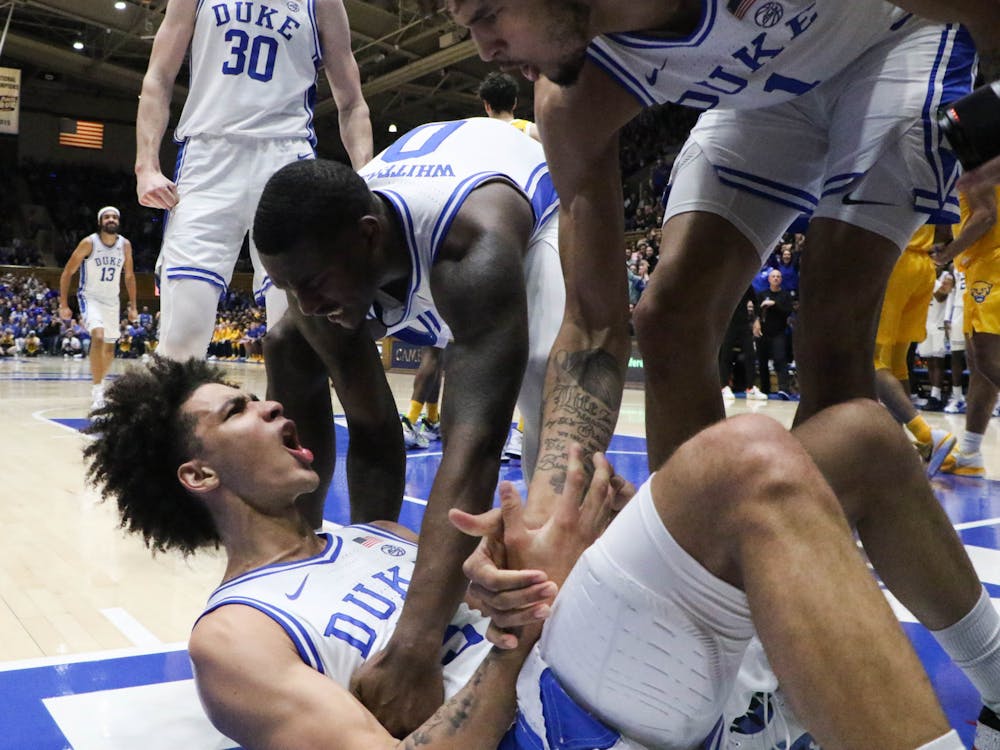As Duke jogged off the court at the halfway point of its Wednesday night matchup against Pittsburgh, fans watching at home could not be blamed for wanting to change the channel. The Blue Devils were struggling to take care of the basketball. The offense looked rushed and disjointed. The team was down by double digits and seemed to be heading for its fifth loss of the season courtesy of former Duke star Jeff Capel.
Twenty minutes of basketball later, Cameron Indoor Stadium was roaring, Blue Devil starters were shouting for joy en route to the locker room and Duke had just notched its 13th win of the season 77-69.
What changed? For starters, Wednesday night’s contest proved that Duke is capable of change: The Blue Devils sharpened up mid-game and turned an 11-point halftime deficit into an eight-point victory. The Cameron Crazies packed into the stands watched two different Duke teams—the first-half team and the second-half team. The first-half team turned the ball over 12 times and struggled to pass the ball effectively to create space for easy offensive chances. The second-half team only had five turnovers and demonstrated significantly better ball movement.
“There were too many one-pass possessions in the first half. Too many times we just gave them the ball. And not only does it give them baskets, but it also gives them a ton of confidence. So I think we learned that tonight,” head coach Jon Scheyer said after the game.
Sophomore guard Jaylen Blakes echoed his coach’s focus on turnovers and ball movement. “I think we did a great job valuing the ball,” said Blakes. “We really shared the balI. I think we had a lot of assists compared to our turnovers, got people open shots and we played together.”
Improved ball security and a more fluid, selfless offense in the second half helped the Blue Devils take control late in the game. A third important variable was rebounding. By the time the final buzzer sounded, Duke had 24 offensive rebounds to Pittsburgh’s nine. Throughout the game, Duke stayed physical in the paint and produced second chances on offense that proved crucial down the stretch.
Filipowski had a particularly special night on the boards, racking up 15 rebounds before the clock struck zero. The freshman played his best game of the season, posting a career-high 28 points to lift his team to an ACC win.
“Just his determination on the boards,” said Scheyer. “To have 15 rebounds against them—they've been right there, statistically, rebounding with other teams—for [Filipowski] to do that against a veteran team like them is a big deal.”
The theme of the night was change—more so than in any other game this season, Duke was able to make specific, successful halftime adjustments. On offense, improved ball security and ball movement in the second half, a continued advantage in rebounds (the final tally was 51 to 28 in favor of Duke) and an impressive night from Filipowski paced the Blue Devils.
On the other side of the ball, Duke employed a switching defense in the second half that dramatically hindered the Panthers’ offensive output. The direct effect of the strategic shift was clear—Pittsburgh scored 43 points in the first half and only 26 points in the final 20 minutes of play.
“I thought in the second half our switching and our defense, I don't know what exactly the exact numbers were, but we held them to 10 or so points for a while there in the second half. So proud of the effort,” said Scheyer.
Freshman center Dereck Lively II excelled in this strategy and was instrumental in disrupting Pittsburgh’s offense during the game’s final stretch.
“When you look at switching defense, you want to YouTube it or look it up, what Dereck did and how he did it was so impressive,” said Scheyer, who also emphasized how his team’s consistent effort on defense was helpful in pushing past the Panthers.
Better ball movement, cutting down on turnovers, trying different things defensively, maintaining a consistent rebounding advantage—the list goes on and on. The bottom line is that Duke was faced with a tough opponent, fell behind at the half, and refused to fade away.
The resilient performance is especially encouraging after the team’s blowout loss to N.C. State, in which Duke fell behind early and was unable to claw its way back. This time, faced with a difficult opponent and a double-digit halftime deficit, the coaching staff made effective adjustments, the players upped their game and the Blue Devils left a cheerful Cameron Indoor with their 13th win of the season.
Duke will need to maintain its ability to quickly respond to adversity, as its next matchup is against a strong Clemson team looking for its 15th win of the season.
Get The Chronicle straight to your inbox
Signup for our weekly newsletter. Cancel at any time.

